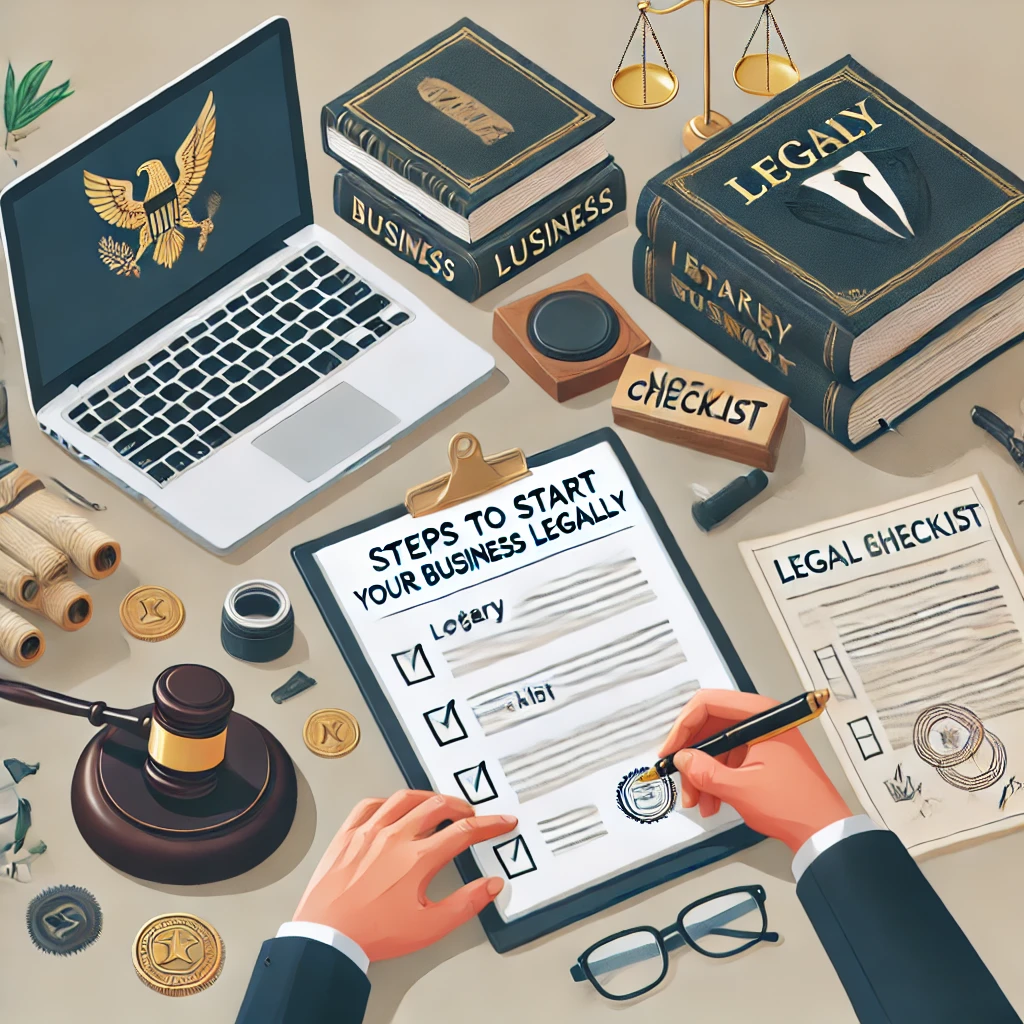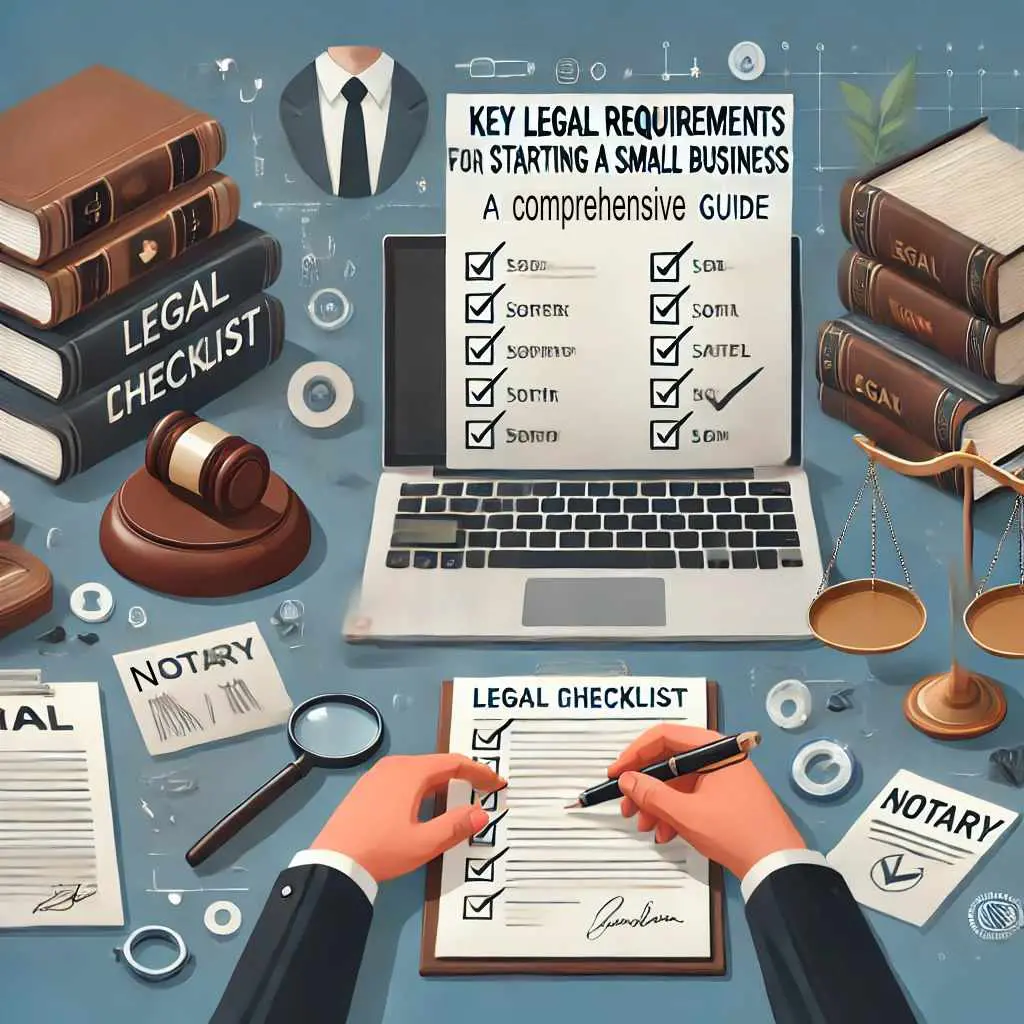What legal steps are necessary to start a small business?
Launching a small business is an exciting venture, but understanding the legal requirements is crucial for setting a strong foundation. This comprehensive guide will walk you through the essential legal steps needed to start a small business. This guide covers everything from choosing a business structure to obtaining necessary licenses, ensuring your new business complies with all important legal regulations.
What Do You Need to Start a Small Business?
Basic Legal Requirements for Starting a Small Business
Starting a small business entails a series of legal requirements to ensure you’re compliant with federal, state, and local regulations. Among the primary steps, every business owner must choose a business structure, register a business name, and obtain an Employer Identification Number (EIN) if necessary. Particularly, understanding the specific business regulations and requirements for the type of business you plan to start is critical. Additionally, depending on whether you’re operating a home-based business or setting up a physical store, business location requirements may also vary.
Steps to Start Your Business Legally
The path to legally starting your business involves several steps. First, you need to formulate a comprehensive business plan that outlines your business idea, goals, and strategies. Following this, you should select a suitable business structure that aligns with your business activities. Next, you will need to register your business name with the relevant authorities to protect your business identity. It’s also essential to apply for business licenses and permits, which vary depending on your business type and location. Finally, setting up a business bank account is a critical step to separate your personal finances from your business transactions. What legal steps are necessary to start a small business?

Essential Documentation for Your New Business
Starting a new business requires various documentation to comply with legal requirements. Key documents include your business plan, which outlines your strategy and financial projections, and any licenses or permits necessary for your specific business operations. Depending on your chosen business structure, you’ll also need to file legal documents such as articles of incorporation or partnership agreements. Ensure you have your Employer Identification Number if required, and your Social Security Number for individual business taxes. Legal documentation helps in safeguarding your business and simplifying future audits and legal compliance.
How to Choose the Right Business Structure?
Understanding Different Types of Business Structures
Selecting the right business structure is one of the most important legal requirements for starting a small business. Different structures, such as sole proprietorships, partnerships, limited liability companies (LLCs), and corporations, offer various benefits and obligations. Each business structure impacts your tax obligations, legal liabilities, and even the ease of raising capital. For instance, a sole proprietorship is simple to set up but doesn’t offer liability protection, whereas an LLC provides personal liability protection and tax flexibility. What legal steps are necessary to start a small business?
Legal Requirements for Each Business Type
Each type of business structure comes with its own set of legal requirements. For a sole proprietorship, you may need to register your business under a name other than your legal name and need minimal paperwork. Partnerships require a partnership agreement and possibly registering with the state. Incorporating as an LLC or corporation requires filing articles of incorporation, setting up bylaws, and adhering to ongoing compliance requirements such as annual reports and taxes. Understanding these requirements helps in avoiding potential legal pitfalls and ensuring your business runs smoothly.
Choosing the Best Structure for Your Small Business
Choosing the best structure for your small business depends on several factors, including the nature and size of your business, your willingness to bear personal risk, and your funding needs. Consulting with a legal advisor or utilizing resources from the Small Business Administration can provide insights into the most suitable legal structure for your business. Additionally, considering future expansion plans and potential investors can influence your decision. The right structure not only complies with legal requirements but also provides the flexibility and protection necessary for growth and stability.
Why Do You Need to Register Your Business Name?
Importance of Registering Your Business Name
What legal steps are necessary to start a small business? Registering your business name, also known as a “Doing Business As” (DBA) name, is a critical legal requirement for starting a small business. This process prevents others from using the same name in your area and helps build your brand identity. A registered business name can protect your business legally by establishing a clear link between the name and your business entity. Failure to register your business name could result in legal disputes and the need to rebrand, which can be costly and time-consuming.
Steps to Register Your Business Name
The process to register your business name varies depending on your location and business structure. Typically, it involves checking the availability of the name through the state’s business registration website or database, filling out the necessary forms, and paying a registration fee. Some jurisdictions require you to publish a notice of your new business name in a local newspaper. Additionally, you may need to renew your registration periodically. Ensuring this is completed accurately helps in legally protecting your business name from infringement.
Legal Tips for Naming Your Business
Choosing a legal name for your business involves more than just creativity. It is crucial to ensure that the name is not already in use by another business and does not violate any trademarks. Conducting a thorough trademark search can prevent legal issues. Moreover, the chosen name should be easy to remember, spell, and relate to your business. Consulting with a legal expert for guidance can save time and protect your business interests. Keeping these legal tips in mind can help you create a strong, legally compliant brand identity for your business.
What Types of Business Licenses and Permits Are Necessary?
Overview of Common Business Licenses
What legal steps are necessary to start a small business? Business licenses and permits are important legal requirements for starting a small business. The specific licenses needed depend on your industry, business activities, and location. Common licenses include general business licenses, professional licenses for specific fields like healthcare or law, and health permits for food-related businesses. You may also need zoning permits if your business location requires it. Ensuring you have all the necessary licenses allows you to conduct business legally and avoid fines or shutdowns.
How to Obtain Permits for Your Business
Obtaining required permits for your business involves several steps, starting with identifying the permits relevant to your industry and location. Researching through local government websites, contacting local business development centers, or consulting the Small Business Administration can provide valuable information. The application process usually requires completing forms, providing specific business documentation, and paying applicable fees. Keeping track of renewal dates and maintaining compliance is essential for uninterrupted business operations.
State and Local Requirements for Business Licenses
In addition to federal requirements, each state and locality may have its own specific licensing requirements. These can include sales tax licenses, environmental permits, and other regulatory authorizations needed to operate legally in your state or municipality. Some cities mandate their own local business licenses in addition to state requirements. Understanding these varied requirements and ensuring compliance through proper application and renewal can protect your business from legal complications and fines.
How to Open a Business Bank Account?
Steps to Open a Business Bank Account
What legal steps are necessary to start a small business? Opening a business bank account is a crucial step in separating your personal and business finances. The process starts with choosing a bank that offers favorable business banking services. You’ll need to provide documentation, including your business registration documents, EIN, and possibly your Social Security Number for sole proprietors. Some banks may also require a copy of your business plan. Once the account is set up, it helps in organizing business transactions, applying for business loans, and maintaining accurate financial records.

Why You Need a Business Bank Account
A business bank account is essential for managing your business’s finances effectively. It separates personal assets from business assets, which is critical for liability protection and maintaining the legal structure of your business. It also simplifies tax preparations and meets the requirements for applying for business loans or lines of credit. A dedicated business account lends professionalism to your operations and makes tracking income and expenses more efficient, helping small business owners stay organized and focused on growth.
Documents Required for Opening a Business Bank Account
To open a business bank account, you’ll need several key documents. These typically include your business registration certificate, EIN, business licenses and permits, and personal identification such as a driver’s license. If your business is an LLC or corporation, you may also need to submit articles of incorporation or an operating agreement. Providing the correct documentation ensures a smooth account set-up process and compliance with banking regulations.
FAQ What legal steps are necessary to start a small business?
Q: What are the key steps to start a business?
A: To start a business, you need to follow several key steps. These include choosing your business, identifying your business structure, getting your business name registration done to ensure your business name isn’t already in use, and securing any necessary licenses or permits. Additionally, you will need to fund your business and set up business insurance to protect your operations.
Q: How important is a business plan when starting a small business?
A: A business plan is crucial when you start a business as it outlines your business needs, goals, strategies, and financial projections. It serves as a roadmap for your business and is often essential for securing financing from investors or banks. A well-crafted business plan can significantly increase your chances of operating a successful business.
Q: Why is choosing the right business location important?
A: The business location is critical because it impacts your customer base, operating costs, and overall business success. The state where your business is located can also affect your taxes, legal obligations, and accessibility to resources. Make sure to research and choose a location that aligns with your business needs and target market.
Q: What types of business insurance are necessary for a small business?
A: Business insurance is essential for protecting your business against risks. Common types of business insurance include general liability insurance, property insurance, and workers’ compensation insurance. Depending on the nature of your business, you may also need product liability insurance, professional liability insurance, or commercial auto insurance. Make sure your business is adequately covered to avoid potential legal and financial problems.
Q: What are the legal responsibilities when hiring employees?
A: When you hire employees, there are several small business legal requirements you must comply with. These include obtaining an Employer Identification Number (EIN), setting up tax withholding, adhering to labor laws and employment regulations, and providing a safe working environment. Additionally, you must handle payroll taxes and keep your business compliant with the relevant employment laws.
Q: How does the business name registration process work?
A: Business name registration involves ensuring your business name isn’t already in use by another entity. This typically requires checking with your state’s business filing office and sometimes the U.S. Patent and Trademark Office. Registering your business name can provide legal protection and build brand identity. It’s crucial to verify that your business name isn’t already taken to avoid legal disputes and protect your brand.
Q: What tax obligations will a small business face?
A: A small business will face various tax obligations, including income tax, payroll tax, sales tax, and self-employment tax. It is important to familiarize yourself with the specific tax requirements in your business’s state. Meeting these tax obligations is essential for staying compliant and avoiding penalties. Consulting a tax professional can help you navigate the complexities of business taxes and maintain proper documentation and filings.
Q: Why is it important to choose the right business structure?
A: Choosing the right business structure is important because it affects your legal and tax obligations, personal liability, and ability to raise capital. Common business structures include sole proprietorship, partnership, limited liability company (LLC), and corporation. Each structure has advantages and disadvantages, so it’s crucial to select one that aligns with your business goals, size, and nature.
Q: How can I fund my business effectively?
A: To fund your business, you can explore various options such as personal savings, loans, investors, crowdfunding, and grants. It’s essential to assess how much capital your business needs and identify the best funding sources that align with your financial situation and business plan. Preparing a solid financial plan and demonstrating a viable business model can increase your chances of securing the necessary funds to run your business successfully.
Q: What are the ongoing legal responsibilities for a small business?
A: Ongoing legal responsibilities for a small business include maintaining proper licenses and permits, ensuring timely tax filings, staying compliant with employment laws, and renewing business insurance policies. It’s also essential to keep accurate financial records and stay updated on regulation changes that may affect your business. Continuously monitoring and adhering to these responsibilities helps keep your business in good legal standing.
What legal steps are necessary to start a small business?





